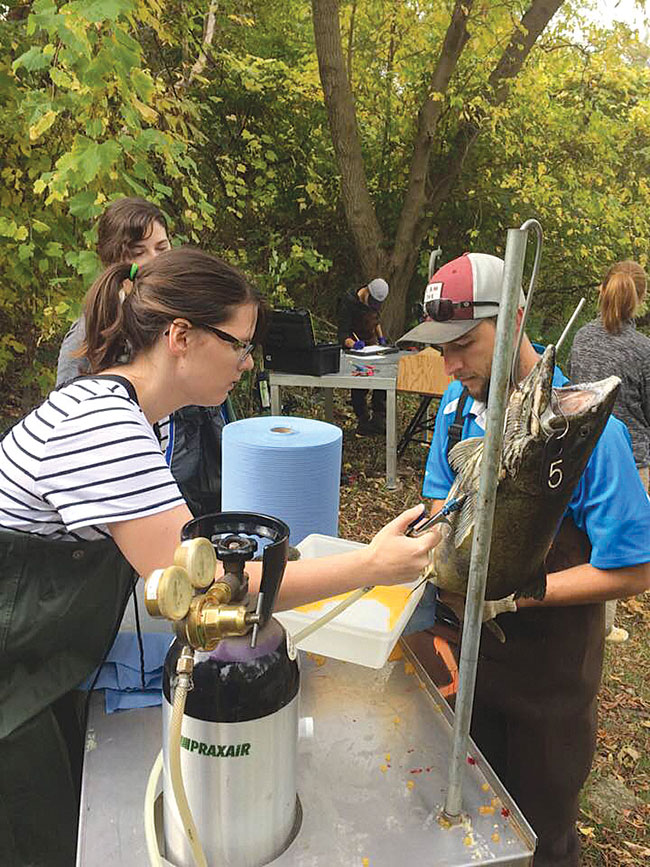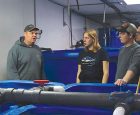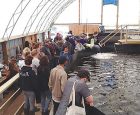
Features
Education
Remotely educational
How aquaculture skills programs are navigating COVID-19
January 8, 2021 By Ron Hill
 Wherever possible, colleges have moved labs and activities outside.
Wherever possible, colleges have moved labs and activities outside. Educational institutions across the world have faced major challenges as the COVID-19 crisis has forced people to physically distance and avoid congregating in groups. The nature of education has been forced to change as institutions modify their delivery to keep students and staff safe.
Aquaculture skills courses that focus on providing hands-on aquaculture learning have been forced to make a myriad of changes to keep people safe and contain the spread of the virus, without diminishing the quality of the program or losing hands-on training time. Canadian colleges providing aquaculture skills have first and foremost been guided by local health authorities and their guidelines on masks, physical distancing and group gathering limits.
To that effect, each institution has chosen to minimize the amount of in person classroom time. Lectures have been moved online, with professors delivering material and lessons via remote software. Video conferencing technology has allowed presentations and lectures to be delivered without loss in lecture quality, and still facilitate discussion and group forums.
Despite remote learning, enrollment is down across Canada, most significantly because of the vast decline in international students. Between travel restrictions around the world and the unknowns of COVID-19, international students are not entering Canada for training. Many domestic students are choosing to take a year off and work, rather than entering post -secondary in the current environment.
Hands-on and hybrid
Providing hands-on training for aquaculture is the most difficult and dangerous facet of learning during the pandemic. Operating within local guidelines, Canadian colleges have adopted a hybrid model for skills training. Everything that can be done virtually is done online, while the most essential skills are identified and then taught in person under a modified system.
In British Columbia, Vancouver Island University (VIU) professor Dr. Duane Barker explains how VIU has approached operating in the COVID-19 environment: “Here at VIU, we spent the summer deciding what skills are must-haves to be taught in-person. We conducted risk assessments course by course and made modifications to provide the safest environment while providing quality education and meeting course outcomes.
“It was clear we needed to minimize the time students are on campus. We dropped the group sizes for labs and moved everything we could out of the lab and into the field, using parks, shorelines and beaches for field labs and activities.”
For laboratory activities that need to be in the lab, the labs themselves have been modified and controls put in to keep people safe. “Staff and students are required to wear facemasks and glasses. We have modified our space so that we are only using one laboratory and rotating all students and activities through it. It has become a one-way lab, where students enter through one door, following a path as they move through the lab, performing the lab activities and moving through stations until they reach the exit door. Guidelines and arrows have been put on the floor and ‘cells’ have been created for students and staff to stay within to ensure physical distancing. Disinfection stations have been installed at the entrance and exit of the lab,” Barker says.
Industry and co-ops
With the risks of COVID-19, businesses have shut their doors to tour groups and on-site activities. To support the aquaculture programs, business have provided support from afar in the form of virtual farm tours, online lectures and speakers.
Barker explains, some of its VIU partners have also had to change their protocols for student placements and cooperative programs.
“Our partners are obviously not welcoming students for their weekly co-ops and placement, because of the virus risks as they have in past years, but are still being very supportive of the program. Instead they have offered to interview students each week so the students can network and learn about the different operations around Vancouver Island,” Barker says.
All institutions are reporting that co-op semesters and long-term placements are going ahead, with many businesses asking co-op students to self isolate for 14 days before working at the farm.
Print this page







